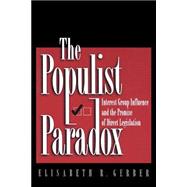
Note: Supplemental materials are not guaranteed with Rental or Used book purchases.
Purchase Benefits
Looking to rent a book? Rent The Populist Paradox [ISBN: 9780691002675] for the semester, quarter, and short term or search our site for other textbooks by Gerber, Elisabeth R.. Renting a textbook can save you up to 90% from the cost of buying.
| List of Figures List of Tables | p. xi |
| Acknowledgment | p. xiii |
| What Is the Populist Paradox? | p. 3 |
| A Theory of Interest Group Influence | p. 6 |
| Motivation: The Study of Interest Group Influence | p. 10 |
| Justification: Why Study Direct Legislation? | p. 15 |
| Plan of the Book | p. 19 |
| Interest Group Choice | p. 21 |
| Forms of Influence | p. 21 |
| Interest Group Choice | p. 27 |
| Achieving Influence | p. 30 |
| Summary and Conclusions | p. 36 |
| Direct Legislation Hurdles | p. 37 |
| Achieving Direct Modifying Influence | p. 38 |
| Achieving Direct Preserving Influence Achieving Indirect Modifying Influence | p. 50 |
| Achieving Indirect Preserving Influence: Opposing an Initiative to Signal the Legislature | p. 52 |
| Behavioral Hurdles | p. 52 |
| Summary and Conclusions | p. 58 |
| Group Characteristics and Resources | p. 59 |
| Monetary and Personnel Resources | p. 59 |
| Using Resources to Overcome Hurdles | p. 60 |
| Membership Characteristics | p. 65 |
| Classifying Groups and Their Resources | p. 69 |
| Hypotheses about Motivations and Forms of Influence | p. 71 |
| Summary | p. 75 |
| Motivations and Strategies | p. 76 |
| Methodology | p. 76 |
| What Do Groups Say They Do? | p. 80 |
| What Do Groups Actually Do? | p. 93 |
| Summary and Conclusions | p. 100 |
| Direct Policy Consequences | p. 101 |
| Direct Policy Consequences | p. 101 |
| Summary and Conclusions | p. 119 |
| Indirect Policy Consequences | p. 121 |
| State Policy Differences | p. 122 |
| Summary and Conclusions | p. 136 |
| The Populist Paradox: Reality Or Illusion? | p. 137 |
| Economic Group Limitations | p. 137 |
| Citizen Group Dominance | p. 140 |
| Implications for the Study of Direct Legislation | p. 140 |
| Implications for the Study Of Interest Group Influence | p. 141 |
| Positive versus Normative Implications | p. 142 |
| A Final Assessment | p. 146 |
| Appendixes | p. 147 |
| Direct Legislation Institutions | p. 147 |
| Survey Of Organizations | p. 152 |
| References | p. 159 |
| Index | p. 165 |
| Table of Contents provided by Publisher. All Rights Reserved. |
The New copy of this book will include any supplemental materials advertised. Please check the title of the book to determine if it should include any access cards, study guides, lab manuals, CDs, etc.
The Used, Rental and eBook copies of this book are not guaranteed to include any supplemental materials. Typically, only the book itself is included. This is true even if the title states it includes any access cards, study guides, lab manuals, CDs, etc.